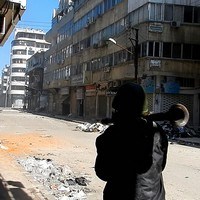The Syrian civil war has become one of the most complex and tragic conflicts of the 21st century. The Syrian Observatory for Human Rights estimates that 80,000 have died since 2011. The United Nations believes that 1.5 million Syrians are refugees, and that number could increase dramatically in coming months. Day by day, Syria is losing an entire generation, one that will be scarred by violence and unprepared to be productive citizens someday. Yet the conflict continues because those who could stop it—the Assad regime and its supporters, the various rebel movements and the external nations supporting one side or the other—believe that time is on their side and things will eventually turn in their favor, or else that ending the fighting is not worth the costs. Sadly the conflict is not yet ripe for resolution, and, as is always the case, the innocent pay the price.
It is impossible to predict the outcome of the war with certainty, but it is possible to sketch feasible scenarios. One is an outright victory for the Assad regime. A few months ago this seemed unlikely, but with continued support from Iran and Russia, the entry of Hezbollah fighters into the fray and continued fragmentation among the rebels, government forces are on the offensive and have retaken some ground. A major battle is raging for Qusayr, a strategic city long held by rebels. If the government and its Hezbollah allies win, it may retain the offensive for a time. This is not unusual: Most insurgencies see ebbs and flows. But so long as the Syrian rebels are able to get support from somewhere, even Bashar al-Assad's sordid cast of allies is unlikely to carry him to an unambiguous victory.
What, then, of an outright rebel win? This is more likely than a regime victory, particularly if some way can be found to interrupt or end Iranian support for Assad and to convince a significant number of Alawites—Assad's core supporters—that they will not be annihilated after a rebel victory and, in the case of the elite, that they will be offered external sanctuary. From the U.S. perspective, there are both good and bad types of rebel victories. A good one would lead to a stable government that rejects wholesale retribution against the Alawite community and, eventually, embraces democracy. It would require significant outside assistance and probably a multinational peacekeeping force, possibly for a very long time. Iraq and Libya demonstrate how challenging it is to build a stable democracy in societies divided and wounded by pathological dictatorships.

